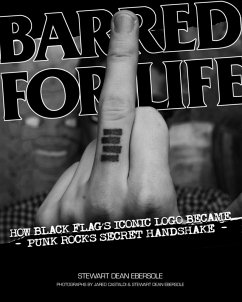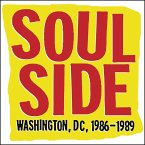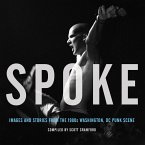"The Bars represent me finding my people. We were like a tribe. Together we are strong whereas before we felt weak and ostracized."
Barred for Life is a photo documentary cataloging the legacy of Punk Rock pioneers Black Flag, through stories, interviews, and photographs of diehard fans who wear their iconic logo, The Bars, conspicuously tattooed upon their skin. Author Stewart Ebersole provides a personal narrative describing what made the existence of Punk Rock such an important facet of his and many other people's lives, and the role that Black Flag's actions and music played in soundtracking the ups and downs of living as cultural outsiders.
"The Bars say 'I'm not one of them,' and it also lets the right people know that I am one of them." Stark black-and-white portraits provide visual testimony to the thesis that Black Flag's factual Punk-pioneering role and their hyper-distilled mythology are now more prevalent worldwide then when the band was in service. An extensive tour of North America and Western Europe documents dedicated fans bearing Bars-on-skin and other Black Flag iconography. Nearly four hundred "Barred" fans lined up, smiled/frowned for the camera, and issued their stories for the permanent record.
"It is the black flag of anarchism, and that is the opposite of the white flag of surrender." Barred for Life expands its own scope by presenting interviews with former Black Flag members and those close to the band. Interviews with alumni Dez Cadena, Ron Reyes, Kira Roessler, Keith Morris, and Chuck Dukowski, as well as photographers Glen E. Friedman and Ed Colver, and the man responsible for tattooing The Bars on more than a few Black Flag players, Rick Spellman, round out and spotlight aspects of Black Flag's vicious live performances, forward-thinking work ethic, and indisputable reputation for acting as both champions and iconoclastic destroyers of the Punk Rock culture they helped to create. "When I see The Bars I think 'Black Flag the band,' but they also represent an entire movement of people that are not going to conform. They are part of a culture of people that stand up for themselves."
Barred for Life is a photo documentary cataloging the legacy of Punk Rock pioneers Black Flag, through stories, interviews, and photographs of diehard fans who wear their iconic logo, The Bars, conspicuously tattooed upon their skin. Author Stewart Ebersole provides a personal narrative describing what made the existence of Punk Rock such an important facet of his and many other people's lives, and the role that Black Flag's actions and music played in soundtracking the ups and downs of living as cultural outsiders.
"The Bars say 'I'm not one of them,' and it also lets the right people know that I am one of them." Stark black-and-white portraits provide visual testimony to the thesis that Black Flag's factual Punk-pioneering role and their hyper-distilled mythology are now more prevalent worldwide then when the band was in service. An extensive tour of North America and Western Europe documents dedicated fans bearing Bars-on-skin and other Black Flag iconography. Nearly four hundred "Barred" fans lined up, smiled/frowned for the camera, and issued their stories for the permanent record.
"It is the black flag of anarchism, and that is the opposite of the white flag of surrender." Barred for Life expands its own scope by presenting interviews with former Black Flag members and those close to the band. Interviews with alumni Dez Cadena, Ron Reyes, Kira Roessler, Keith Morris, and Chuck Dukowski, as well as photographers Glen E. Friedman and Ed Colver, and the man responsible for tattooing The Bars on more than a few Black Flag players, Rick Spellman, round out and spotlight aspects of Black Flag's vicious live performances, forward-thinking work ethic, and indisputable reputation for acting as both champions and iconoclastic destroyers of the Punk Rock culture they helped to create. "When I see The Bars I think 'Black Flag the band,' but they also represent an entire movement of people that are not going to conform. They are part of a culture of people that stand up for themselves."
Dieser Download kann aus rechtlichen Gründen nur mit Rechnungsadresse in A, D ausgeliefert werden.









